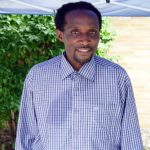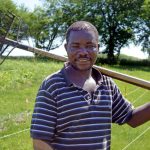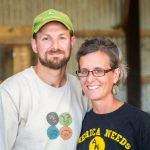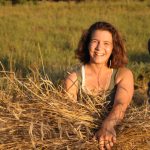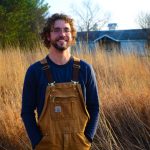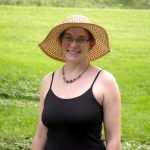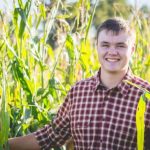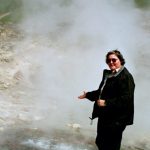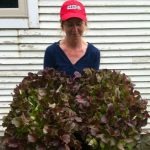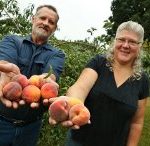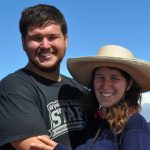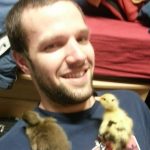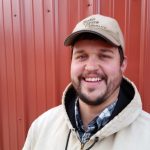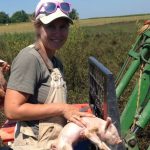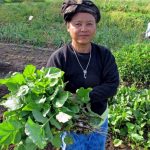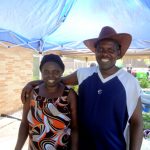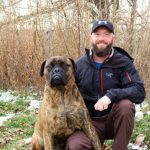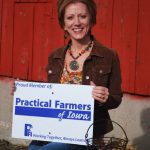Do you want to cut input costs and reduce your nitrogen application? Apply for our N Rate Risk Protection Program!
Savings Incentive Program Class of 2016
These Savings Incentive Program recipients enrolled in the program in 2014 and graduated in 2016.
 Congera Alex
Congera Alex
No matter where Congera Alex calls home, he has always been called a farmer. A native of Burundi in Africa, Alex was forced to flee his home country due to unrest and fighting. He became a refugee in Tanzania where he continued his passion for producing vegetables. Now in Des Moines, he is beginning to become accustomed to the climate in the United States and the types of crops that can be grown here. Alex has been excited to share with his customers some of the familiar produce he grew while in Africa, but has also been eager to learn about popular American fruits and vegetables. A member of Lutheran Services in Iowa’s Global Greens incubator farm, Alex looks forwards to expanding his markets and becoming an independent business owner. Learning from a mentor and having the opportunity to save funds to purchase land both encouraged Alex to participate in the Savings Incentive Program.
 Benjamin Barron
Benjamin Barron
Benjamin Barron, of Jefferson, has been working diligently to learn about all aspects of farming in preparation for starting Olde Style Farm. Olde Style Farm aims to be a diversified crop and livestock farm that he intends to operate organically with his wife, Danielle Eberhardt. Benjamin got his first taste of farming as a 10-year-old helping on the family’s 40-acre farm. He worked in construction for a few years after high school, but says “the pull of agriculture was still strong.” In 2009 he started working on a 1,500-acre conventional row crop farm in southeastern Missouri, where he worked for five years. In the spring of 2014, Benjamin participated in Practical Farmer’s Labor4Learning Program, working with Shriver Farms, an 1,800-acre organic row crop farm in Jefferson. Benjamin’s vision for his farm includes growing pasture, a market garden and a small orchard, in addition to row crops and mixed livestock, on 200 to 500 acres. With his savings match, he hopes to purchase breeding stock or livestock-related farm equipment, such as a feed mixer or manure spreader.
 Bizimana Charles
Bizimana Charles
Bizimana Charles grew up in Burundi in Africa where his family farmed. When he was three, war broke out in Burundi. Charles’ family fled to the Congo where they continued to farm. They were unable to eat much of what they produced because most of the crop was saved for seed or sold to pay for school fees. In 1996, the family was separated due fighting in the Congo. Charles’ family went back to Burundi and Charles and his children became refugees in Tanzania. In 2009, the family resettled in Des Moines with the help of Lutheran Services in Iowa. He now grows traditional African and American crops on a quarter acre at Lutheran Services’ Global Greens incubator farm. Charles’ vision is to expand his farm to fully support and feed his family. Charles is excited to learn weather and planting schedules from his Savings Incentive Program mentor. He plans to use his savings match to purchase necessary machinery to more efficiently operate his business.
 William and Stacey Borrenpohl
William and Stacey Borrenpohl
William and Stacey Borrenpohl desire to provide the farming lifestyle and values they were raised with for their own family. In 2011 they purchased an acreage near LaMotte, Iowa. They raise and direct market lowline beef cattle, pork, and meat goats on their Woven Strong Farm. William and Stacey are already on their way to achieving their future vision, which includes profitability, robust pricing processes, established customer bases and healthy pasture management.. William and Stacey both have off-farm careers and are raising young children. They are excited to participate in the program to provide accountability and structure to help build their farm despite busy schedules. William and Stacey are considering investing in land or equipment with their savings match.
 Hannah Breckbill
Hannah Breckbill
After college Hannah Breckbill was inspired to start a meaningful career – she interned on a farm and loved the seasons, the surroundings and the fulfillment of growing food. Hannah now operates Humble Hands Harvest, raising annual vegetables marketed in the Decorah area. She also raises meat rabbits and sheep, and hopes to add pork, small grains and perennial crops, including fruit and nut trees. Hannah participated in Land Stewardship Project’s Farm Beginnings and Journeyperson program. She aspires to earn a living from farming while saving money to purchase her own land. She is looking forward to the support the Savings Incentive Program will provide in encouraging her to save money for her farm. When Hannah graduates from the program, she plans to use her savings match to invest in land, perennial crops, a packing shed or greenhouse.
 Jack Davis
Jack Davis
Jack Davis became interested in farming when his parents purchased 23 acres between Adel and DeSoto. Jack helped his parents transform the acreage from a run-down cattle field to a farm with a house, barn, trees and prairie. Jack left the farm to travel; his travels included meeting with farmers across Asia and working for the U.S. Forest Service. In 2012, Jack returned to his family’s land near Adel to pursue a farming career. He worked for Blue Gate Farm through Practical Farmers’ Labor4Learning program during the 2014 season. He has increased his orchard to 50 fruit trees, and his vegetable growing area to a little under an acre. Jack plans to market most of his products wholesale and through CSA. He hopes to add mushrooms, honey, hops, ducks and agroforestry to his farm in the future. Jack applied for the Savings Incentive Program to help stay on track to creating a full-time farming operation. He plans to purchase farm equipment with his savings match.
 Jennie Erwin
Jennie Erwin
Jennie Erwin’s family is full of gardeners. She grew up helping in the garden and has gardened on her own since college; ten years later she’s secured three acres near Boone and just planted her first crop of garlic on the land. Jennie plans to have a sustainable farm that feeds people more than food, and doesn’t do so at the expense of the environment. She plans to become adept at growing on a three-acre scale, and then will secure more land, with a long-term goal of growing ten acres of vegetables. She plans to sell at farmers markets in 2015, along with a couple staple crops to sell through Farm to Folk in Ames. She intends to start a CSA in 2016. Jennie wants help through the Savings Incentive Program to finish her business plan. She is also looking forward to strengthening her support network of other beginning farmers. Jennie is considering purchasing a cooler, greenhouse or land with her savings match.
 Andrew & Naomi Friend
Andrew & Naomi Friend
In 2013, Andrew and Naomi Friend started Friends Flowers in Story City. They currently grow and direct market fresh cut flowers through the Ames Main Street Farmers Market. Andrew grew up on a fresh-cut gladiolus farm in Zillah, Washington. Naomi’s farm history comes from spending time at her grandmother’s farm near Worthington, Minnesota. They share a vision of expanding their one- acre flower business beyond farmer’s markets by selling direct to florists, grocery stores, and wholesalers in central Iowa. A talented artist, Naomi also hopes to design bouquets for weddings and other events. Participating in the Savings Incentive Program can help the Friends advance their flower business by getting them involved with other PFI members who can offer advice and accountability in reaching their goals. They also look forward to getting their business plan ideas down on paper. Potentially, Andrew and Naomi would like to purchase a high tunnel with their match money to extend their growing season.
 Carl Glanzman & Doris Bane
Carl Glanzman & Doris Bane
Operating Nishnabotna Naturals near Oakland, Iowa, since 2010, Carl Glanzman and his wife Doris Bane have been supplying salad greens, apples, rhubarb, berries, squash, radishes, onions, turnips and corn to top-tier Omaha restaurants. This year, they have begun providing cut flowers and ornamental tree and bush cuttings for area florists. Carl’s education as a structural engineer and experience on his family’s Oregon produce farm has motivated him to develop sustainability and resiliency in their organic production methods. Through the Savings Incentive Program, Carl looks forward to his mentor’s advice on exploring various structures that will extend his growing season and hold up to weather conditions in southwest Iowa. He is also eager to learn about practices that will protect his crops from insect pressures. Carl plans to purchase a rotary cultivator and a low or high tunnel greenhouse with his savings match.
 Marty & Tanya Grimm
Marty & Tanya Grimm
For Marty and Tanya Grimm diversity has been the key to a successful farm business. Marty is a work-from-home computer software consultant. Tanya is an accountant, recently immigrated from Russia. Several years ago, the couple, purchased a 34 acre farm near Decorah to develop a compost production facility, whose mission is to ‘Complete the Community Food Cycle’. Due to state requirements, the actual compost area is confined to three acres. However the business, Upper Iowa Organics, has been steadily growing due to support from surrounding communities. In an effort to create a sustainable, self-sufficient farm, Marty began to diversify the remaining 31 organic acres to include a flock of hens and dairy goats. The goats will provide ingredients for value-added products such as soaps and lotions. Marty is interested in adding pigs and cattle. Marty and Tanya recently installed a high tunnel for vegetable production. Through the Savings Incentive Program, Marty and Tanya are looking forward to gaining knowledge about holistic and sustainable farming. Ideas for utilizing his savings match include livestock fencing, planting and harvesting tools, high tunnel trellises, a small mower or tractor, or a refrigeration unit.
 Aidan Hamilton
Aidan Hamilton
Aidan Hamilton grew up in New Zealand on his family’s beef and dairy cattle farm. He has had a strong connection with livestock from a young age. He now lives near Thornton, Iowa where he and his wife began raising heritage pork in the spring of 2014. The values and cultural experiences Aidan gained while in New Zealand continue to influence the decisions he makes now on his Aroha Acres farm. His vision is to establish a sustainable ecosystem producing “beyond organic” farm goods. To do this, Aidan plans to incorporate permaculture principles with pastured sheep, pork, poultry and honeybee enterprises to promote healthy soils, vegetation and water. He sees the Savings Incentive Program as a tool to help him realize his farm vision and strengthen his local community. With his savings match money, Aidan anticipates purchasing breeding livestock to grow his heritage pork production.
 Jarret Horn
Jarret Horn
At the age of 17, Jarret Horn has already decided to pursue a career in agriculture. The homeschooled student began his farming experience with a small flock of laying hens and then transitioned to a herd of Boer goats. In 2013, Jarret decided to focus his farming efforts on direct marketing hogs. Earning some extra money by training horses and running a small lawn care business, Jarret is planning to expand his farm to include row crops and bottle calves in 2015. He is also hoping to raise hogs for Niman Ranch this year. Jarret’s long term plans include attending college to pursue a degree in ag education while continuing to increase his hog herd, start a beef cow-calf enterprise, and begin his own hay production. Jarret looks forward to learning from other experienced farmers and strengthening his savings skills through the Savings Incentive Program. With his savings match funds, Jarret anticipates purchasing a planter or Red Angus breeding heifers.
 Eve Iversen
Eve Iversen
Eve Iversen is an Army veteran as well as a sustainable agriculture PhD student at Iowa State University. She wants to convert her academic training into profitable enterprises that feed people and sustain the earth. Eve has an in-town small-scale plot of land in Story City, where she is constructing a combination henhouse/greenhouse. Eve intends to grow organic hydroponic winter feed for her livestock in the greenhouse. She plans to sell eggs next year through an egg CSA model. Eve wants to expand her enterprises to include additional species of heritage bird breeds for the holiday market. She looks forward to learning from people with years of experience to see what has and has not worked for them. Eve plans to use her savings match to lease additional land near her home to increase her scale of production.
 Lindsay and Travis Kaiser
Lindsay and Travis Kaiser
Lindsay Kaiser moved to Waverly after working on several farms to farm with her husband Travis on his family’s land near Waverly. Travis provides the bulk of the labor for the family’s dairy operation and also raises broilers, laying hens, ducks and turkeys. Last year Lindsay raised and sold two acres of vegetables. She hopes to add perennial fruits and bees to the operation in 2015. This year the Kaisers switched from a flex CSA to a 50 member traditional CSA model. Lindsay and Travis look forward to the incentive to save that the Savings Incentive Program offers, as well as the involvement in field days and business planning and the encouragement of mentors and peers. They plan to put their savings match toward their land payment—they have a verbal agreement to purchase four acres plus the acreage their house sits on from Travis’ family.
 Karen and Matt Koenig
Karen and Matt Koenig
Karen Koenig grew up on a farm where they raised most of their own food. On an acreage near Hampton, Karen and her husband Matt continued the tradition, with the garden growing in size each year. Three years ago Karen and Matt purchased 20 additional acres to start Koenig’s Acres Farm and begin farming on a commercial scale. In addition to farmers markets, they have marketed their produce through a CSA. Karen and Matt want to scale up the farm’s size and profitability to support both of them working full-time on the farm. In addition to raising many kinds of fruits and vegetables, Karen and Matt raise chickens, ducks and turkeys. Karen is looking forward to practice saving through the Savings Incentive Program to make it a habit. She is considering purchasing a tool to increase efficiency on the farm—such as a potato digger, mulcher, or manure spreader—with her savings match.
 Kayla Koether & Landon Corlett
Kayla Koether & Landon Corlett
Kayla Koether grew up on an organic, rotational grazing farm in Northeast Iowa. Her parents (longtime members Greg and Kathy Koether) and grandparents taught her the importance of sustainable farming and demonstrated those practices throughout her childhood. Landon Corlett also grew up in Northeast Iowa. The son of an automotive mechanic, he followed in his dad’s footsteps, went to technical school and became a mechanic. Kayla introduced Landon to agriculture, and both are now passionate about sustainable farming. Together the couple has traveled to New Zealand and Australia to see biodynamic farming in practice, and has studied holistic resource management. They joined the Savings Incentive Program to save money, set goals, and be prepared to start their own mob grazing operation in 2016. Kayla and Landon are considering purchasing fencing materials or a mobile working facility with their savings match.
 Adam Ledvina
Adam Ledvina
Adam Ledvina’s interest in farming started as a young child helping his grandparents on their farms. That interest was strengthened through Central College courses, managing the student organic garden and an internship restoring prairies and forests with the Iowa Natural Heritage Foundation. In 2014, Adam began farming on his own in Toledo Iowa, purchasing seven nannies and a billy goat. The goats produced 10 kids and Adam raised 92 additional bottle-fed kids. Future plans for Adam’s farm include expanding his dairy and meat goat herd and using them to clear brush. In addition to goats, Adam raises ducks and chickens. He plans to add beef cattle, row crops and honey bees to his farm. Adam is looking forward to being part of the Savings Incentive Program and showing that sustainable farming practices can be the bridge between agriculture and conservation. With his savings match money, Adam intends to purchase quality fencing for his goats and perhaps more livestock.
 Greg and Katie Lipes
Greg and Katie Lipes
Greg and Katie Lipes feel called to humanely care for all creatures and to be good stewards of the land. To them this means farming in such a way that keeps the air fresh, the water clean, and ensures that healthy food is accessible to both their animals and their community. As they began their farming journey, Greg and Katie enrolled in Central Illinois Farm Beginnings, wrote a business plan, and interned on farms. They then purchased five acres near Madison, Wisconsin, and started farming on a small scale. In 2013 Greg and Katie plunged into pursuing their dream of farming full-time by renting 178 acres near West Branch. They raise pasture grazed beef (100% grass-fed to finish), pastured Berkshire pork, pastured chicken, pastured heritage turkey (Narragansett), and pastured eggs. Greg and Katie are most excited about the mentorship aspect of the Savings Incentive Program. Preliminary ideas to invest their savings match include a walk-in freezer or a freezer trailer.
 Kate Mendenhall
Kate Mendenhall
Kate Mendenhall has been on the other side of the farming equation, helping farmers be successful, by serving as the executive director for NOFA-NY for the past five years. She and her husband moved back to her hometown of Spirit Lake to start their own farm in 2014. Kate apprenticed at Seven W Farm in Paullina for the 2014 season, and is in planning stages for her own farm, where she will raise organic broilers, pigs and beef cattle on pasture. Kate is looking forward to gaining extra knowledge and support from the Savings Incentive Program to create a sound business plan to help her manage her business successfully. Kate’s list of potential assets to purchase with her savings match include: farm truck, trailer, ATV, pasture infrastructure or materials for broiler houses.
 Ta Kaw Paw
Ta Kaw Paw
While Ta Kaw Paw’s surroundings have changed, her passion for farming has remained constant. She spent her early years in the Karen ethnic group in the mountains of Eastern Burma where she grew rice, sugar cane, long beans, pumpkins, leafy greens, bamboo and cared for livestock such as water buffalo. Ta Kaw Paw was forced to leave her native land in the 1960s and ultimately arrived in Des Moines. She is currently a farmer in the Global Greens program with Lutheran Services in Iowa. While the Iowa winters have been an adjustment for Ta Kaw Paw, she is happy to be farming here and has been introduced to the many different kinds of produce Americans like to eat. In the future, Ta Kaw Paw would like to purchase land to operate her own farm business, Ta Kaw Paw’s Produce, so she can grow good food for others and her family. She is excited about the financial planning assistance and education the Savings Incentive Program can offer. She plans to put her savings match toward a land payment or farm infrastructure.
 Bucumi Simon
Bucumi Simon
Bucumi Simon and his wife Mareselina fled their homeland of Burundi to escape war in 1972. They travelled east to the Congo and then fled back to Tanzania where they were granted refugee status. Simon and Mareselina have both farmed since childhood. In 2008, they moved to Des Moines, Iowa. As beginning Iowa farmers they feel their farm is a cherished way to continue their culture. They grow both African and American crops. Simon currently farms .25 acres of Certified Naturally Grown vegetables through Lutheran Services in Iowa’s Global Greens incubator program. In the future, he aspires to increase his farm size and add livestock and grains. Simon is excited about the learning opportunities the Savings Incentive Program will provide, as well as extra money to invest into his farm business. With his savings match, Simon plans to purchase land, machinery or tools.
 Travis Voss
Travis Voss
Travis Voss’s goal is to transform a neglected property into a productive farm, producing nuts, fruits, and livestock while benefiting wildlife. Travis has been working to clear his five-acre overgrown woodlot near Solon of invasive vegetation. As the property is cleared, he has planted nut and fruit trees as well as poultry forage. Travis anticipates having his first batch of pastured GMO-free poultry on the land in 2015. Future plans include incorporating a follow-the-leader system where pigs or sheep will follow poultry and forage on fallen fruit and nut crops. Marketing plans for the orchard include U-Pick or selling wholesale. As part of the Savings Incentive Program, Travis looks forward to learning from a mentor and other PFI members who have been through the process of starting a new farm and orchard. He plans to use his savings match money to purchase a small mill to press chestnuts into flour or for a livestock shelter.
 Donna Warhover
Donna Warhover
Donna Warhover’s passion for gardening grew stronger while working on a garden project with Goodwill’s Day Habilitation program. The project invited adults with disabilities to start a vegetable garden and was a great success. It was then Donna decided to live a lifestyle that incorporated well-being of environmental, economic, and social dimensions. In 2013, Donna and her husband Bill bought a small farm in Mt Vernon and began forming Morning Glory, A Community Harvest Farm CSA. Morning Glory started with ten shareholders and increased to 20 in the span of one year. Donna grew enough produce to donate over 1000 pounds to those who do not have access to fresh produce. Community, hospitality, and learning opportunities remain top priorities on her working CSA farm. Donna is participating in the Savings Incentive Program to become more involved with PFI and receive direction on business planning. Her list of possible assets to purchase with her savings match includes a high tunnel, refrigeration unit, installation of water hydrants, or additional land.

